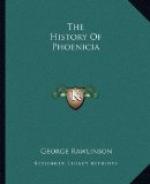The mission of the Phoenicians, as a people, was accomplished before the subjection to Rome began. Under the Romans they were still ingenious, industrious, intelligent. But in the earlier times they were far more than this. They were the great pioneers of civilisation. Intrepid, inventive, enterprising, they at once made vast progress in the arts themselves, and carried their knowledge, their active habits, and their commercial instincts into the remotest regions of the old continent. They exercised a stimulating, refining, and civilising influence wherever they went. North and south and east and west they adventured themselves amid perils of all kinds, actuated by the love of adventure more than by the thirst for gain, conferring benefits, spreading knowledge, suggesting, encouraging, and developing trade, turning men from the barbarous and unprofitable pursuits of war and bloodshed to the peaceful occupations of productive industry. They did not aim at conquest. They united the various races of men by the friendly links of mutual advantage and mutual dependence, conciliated them, softened them, humanised them. While, among the nations of the earth generally, brute force was worshipped as the true source of power and the only basis of national repute, the Phoenicians succeeded in proving that as much could be done by arts as by arms, as great glory and reputation gained, as real a power built up, by the quiet agencies of exploration, trade, and commerce, as by the violent and brutal methods of war, massacre, and ravage. They were the first to set this example. If the history of the world since their time has not been wholly one of the potency in human affairs of “blood and iron,” it is very much owing to them. They, and their kinsmen of Carthage, showed mankind what a power might be wielded by commercial states. The lesson has not been altogether neglected in the past. May the writer be pardoned if, in the last words of what is probably his last historical work, he expresses a hope that, in the future, the nations of the earth will more and more take the lesson to heart, and vie with each other in the arts which made Phoenicia great, rather than in those which exalted Rome, her oppressor and destroyer?
FOOTNOTES
PREFACE
[Footnote 01: Die Phoenizier, und das phoenizische Alterthum, by F. C. Movers, in five volumes, Berlin, 1841-1856.]
[Footnote 02: History and Antiquities of Phoenicia, by John Kenrick, London, 1855.]
[Footnote 03: Histoire de l’Art dans l’Antiquite, par MM. Perrot et Chipiez, Paris, 1881-7, 4 vols.]
[Footnote 04: Will of William Camden, Clarencieux King-of-Arms, founder of the “Camden Professorship,” 1662.]
I—THE LAND
[Footnote 11: See Eckhel, Doctr. Num. Vet. p. 441.]




